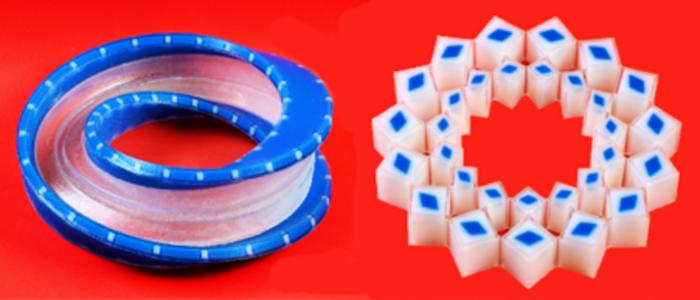Researchers from the UvA Institute of Physics and ENS de Lyon have discovered how to design materials that necessarily have a point or line where the material doesn’t deform under stress, and that even remember how they have been poked or squeezed in the past. These results could be used in robotics and mechanical computers, while similar design principles could be used in quantum computers.

Credit: Xiaofei Guo
Researchers from the UvA Institute of Physics and ENS de Lyon have discovered how to design materials that necessarily have a point or line where the material doesn’t deform under stress, and that even remember how they have been poked or squeezed in the past. These results could be used in robotics and mechanical computers, while similar design principles could be used in quantum computers.
The outcome is a breakthrough in the field of metamaterials: designer materials whose responses are determined by their structure rather than their chemical composition. To construct a metamaterial with mechanical memory, physicists Xiaofei Guo, Marcelo Guzmán, David Carpentier, Denis Bartolo and Corentin Coulais realised that its design needs to be ‘frustrated’, and that this frustration corresponds to a new type of order, which they call non-orientable order.
Physics with a twist
A simple example of a non-orientable object is a Möbius strip, made by taking a strip of material, adding half a twist to it and then gluing its ends together. You can try this at home with a strip of paper. Following the surface of a Möbius strip with your finger, you’ll find that when you get back to your starting point, your finger will be on the other side of the paper.
A Möbius strip is non-orientable because there is no way to label the two sides of the strip in a consistent manner; the twist makes the entire surface one and the same. This is in contrast to a simple cylinder (a strip without any twists whose ends are glued together), which has a distinct inner and outer surface.
Guo and her colleagues realised that this non-orientability strongly affects how an object or metamaterial responds to being pushed or squeezed. If you place a simple cylinder and a Möbius strip on a flat surface and press down on them from above, you’ll find that the sides of the cylinder will all bulge out (or in), while the sides of the Möbius strip cannot do the same. Instead, the non-orientability of the latter ensures that there is always a point along the strip where it does not deform under pressure.
Frustration is not always a bad thing
Excitingly, this behaviour extends far beyond Möbius strips. ‘We discovered that the behaviour of non-orientable objects such as Möbius strips allows us to describe any material that is globally frustrated. These materials naturally want to be ordered, but something in their structure forbids the order to span the whole system and forces the ordered pattern to vanish at one point or line in space. There is no way to get rid of that vanishing point without cutting the structure, so it has to be there no matter what,’ explains Coulais, who leads the Machine Materials Laboratory at the University of Amsterdam.
The research team designed and 3D-printed their own mechanical metamaterial structures which exhibit the same frustrated and non-orientable behaviour as Möbius strips. Their designs are based on rings of squares connected by hinges at their corners. When these rings are squeezed, neighbouring squares will rotate in opposite directions so that their edges move closer together. The opposite rotation of neighbours makes the system’s response analogous to the anti-ferromagnetic ordering that occurs in certain magnetic materials.
Rings composed of an odd number of squares are frustrated, because there is no way for all neighbouring squares to rotate in opposite directions. Squeezed odd-numbered rings therefore exhibit non-orientable order, in which the rotation angle at one point along the ring must go to zero.
Being a feature of the overall shape of the material makes this a robust topological property. By connecting multiple metarings together, it is even possible to emulate the mechanics of higher-dimensional topological structures such as the Klein bottle.
Mechanical memory
Having an enforced point or line of zero deformation is key to endowing materials with mechanical memory. Instead of squeezing a metamaterial ring from all sides, you can press the ring at distinct points. Doing so, the order in which you press different points determines where the zero deformation point or line ends up.
This is a form of storing information. It can even be used to execute certain types of logic gates, the basis of any computer algorithm. A simple metamaterial ring can thus function as a mechanical computer.
Beyond mechanics, the results of the study suggest that non-orientability could be a robust design principle for metamaterials that can effectively store information across scales, in fields as diverse as colloidal science, photonics, magnetism, and atomic physics. It could even be useful for new types of quantum computers.
Coulais concludes: ‘Next, we want to exploit the robustness of the vanishing deformations for robotics. We believe the vanishing deformations could be used to create robotic arms and wheels with predictable bending and locomotion mechanisms.’
Journal
Nature
Method of Research
Experimental study
Subject of Research
Not applicable
Article Title
Non-orientable order and non-commutative response in frustrated metamaterials
Article Publication Date
14-Jun-2023




